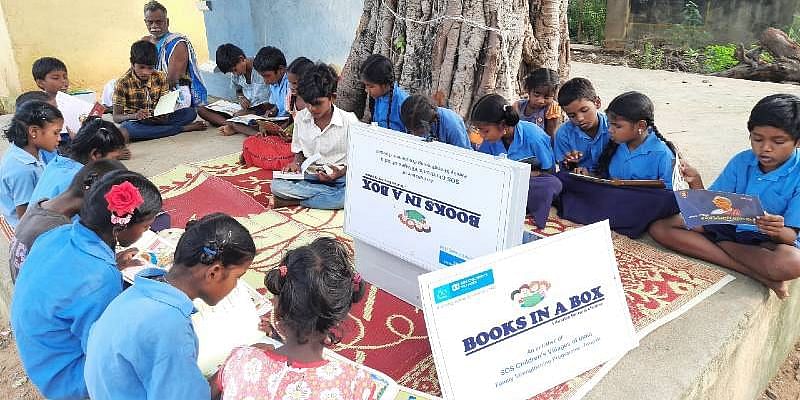Every three months, the children of Chintapalli village in Visakhapatnam await the arrival of a special delivery — a unique trunk of 100 books. The children share the books amongst themselves, and once they are read, they package and send them to children in another village, while awaiting their next delivery of pre-loved books.
This unique exchange programme was launched by SOS Children’s Village in 2019 to encourage a love for reading and learning among children in rural communities who have no access to libraries. Books are collected through friends of SOS at each project, and by donors and sponsors. SOS has also helped to purchase the trunks and some storybooks.
Part of the Family Strengthening Program (FSP), Books in a Box was launched after extensive discussions with families and the community.
“We did an extensive study into the development needs of the families, children, and community. We also spoke to different age groups of school-going children who understood that developing a reading habit was very important for personality development and growth,” Sumanta Kar, Secretary-General of SOS Children’s Villages of India (SOS CVI).
Books in a Box is a unique literacy initiative by SOS Children's Village that encourages reading among children with no access to libraries
A major concern was the lack of libraries near their villages. “While thinking how we could support the cause, various challenges came up like space, building, maintenance, etc. So, with the help of groups of children, we initiated a Bal Panchayat in each location,” says Kar. In places where there is no building to store the books, the Bal Panchayat Heads are in charge of the books that are stored in the trunk in their homes.
The initiative has been a resounding success and has spread across Tamil Nadu, Telangana, Andhra Pradesh, Karnataka, and Puducherry. If there is a library nearby, the Bal Panchayat is encouraged to take a membership in the library. “So our FSP Animators collect 100 books at a time and distribute them among the children. After a week, they collect all the books and return and the next round of books are borrowed from the library,” says Kar.
The programme has led to many children seeing a significant improvement in their academics. Among them is Sangeeta, who says, “My mother studied only up to seventh grade. Hers was a child marriage. When my father passed away, I decided to drop out of school. But the SOS Village Programme encouraged me to continue studying. We created a library and it has benefited many children. Today, I am proud to be a part of the first generation of children from my community who have passed the 10th grade.”
Ashiq, a student from Udamalpadu in Chittoor, says, “The SOS support for Education really helped us in improving our studies. I was the winner in the district-level science exhibition.”“We review the plan once every six months to ensure that the programme is on the right track. Gaps, if any, are identified and addressed after the review,” says Kar. The initiative goes beyond educating the children. “We provide support for their caregiver for income generation, provide necessary skill training to the caregivers, and parenting and child safeguarding training as well. Their health and nutrition are also addressed through necessary medical assessment,” he adds. Self Help Groups (SHGs) are also created at the start of the programme to provide training and financial support, where needed. The loans to the family provided through the SHG are returned to the SHG by each caregiver at a mutually agreed time. This return of money to SHG makes enough revolving funds and it works like a bank for many of the caregivers, and can be used for their future needs even after SOS FS exit from that cluster after a period of five years or the families become self-reliant. Reddemma, a caregiver, says, “Earlier, the children were sitting idle in the house and watching TV. Now, they are more active and read books frequently and discuss them with their peers. My children are now showing more interest in education; I am really so proud.” However, due to the coronavirus pandemic and the subsequent restrictions, the children are no longer able to exchange books amongst themselves as freely as before. The elders in the village have requested that safety precautions be followed, fearing the spread of the pandemic. Children who want to borrow books will now have to go to the Bal Panchayat centre, which is sanitised daily. Each book is then individually sanitised and given to the child who has to return it to the centre after they have read it. Source: yourstory




.jpg)






.jpg)

.jpg)
.jpg)
.jpg)
.jpg)
.jpg)
.jpg)










Sorry! No comment found for this post.